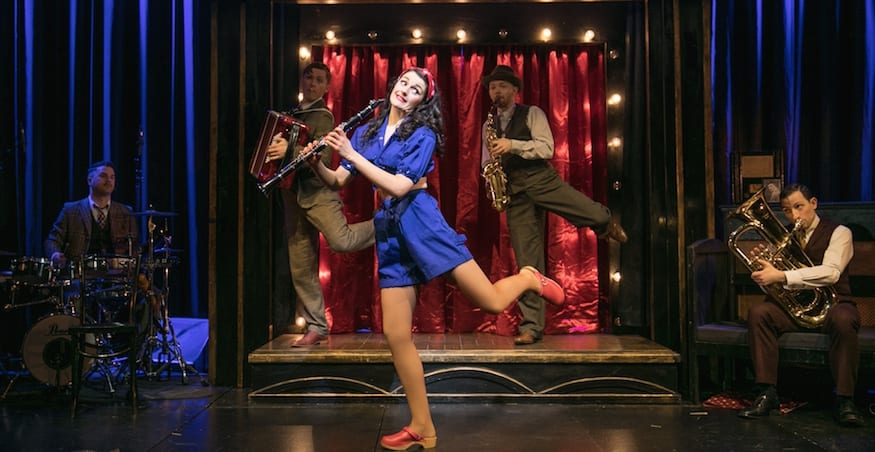Nestled on the first floor of the Hippodrome, above the pulsating casino with roulette wheels and blackjack tables, is The Matcham Room Theatre. It is an intimate venue for cabaret and one which sets you close to the stage to enjoy Matthew Bugg’s cabaret musical Miss Nightingale. The show is a raunchy and campy return to London’s exhilarating theatrical world during the Blitz.
Lauren Chinery plays Maggie Brown, a nurse with a heavy northern twang in her voice and dreams of being a singing, spinning and leg-kicking Forces’ Sweetheart. Her aspirations are supported by her dear friend George Nowodny, played by Matthew Floyd Jones, who is a Polish-Jewish refugee composer; he is now writing lyrics to help Maggie hatch from her egg and move into the spotlight. Sir Frank, a Noël Coward-type impresario, is played by Oliver Mawdsley, and he takes the pair under his wing, providing patronage and resources to transform Maggie into the seductively enigmatic ‘Miss Nightingale’.
This musical expertly engages with themes of gender and sexuality in the ‘40s. Nowodny fondly remembers the gender fluidity and liberal eroticism of Weimar Berlin in the song “Meine Liebe Berlin”. Later, a romance blossoms between Frank and Nowodny, showcased in the passion of Frank’s singing in “Mister Nightingale”, but both their feathers are ruffled when Tom Connor (Adam Langstaff) threatens to expose the relationship. These songs highlight that although gay subculture was kept underground it was also wildly thrilling and expressive.
But it’s the fun innuendo-filled numbers performed by Miss Nightingale elicit the most laughter from the audience. For instance the ‘Sausage Song’ is a light-hearted take on wartime national rationing brimming with sausage-related sexual puns and physical comedy that really makes Miss Nightingale an endearing figure as well as an attractive icon; her comedy songs often feature phallic references and props, also requiring her to change into a ridiculous costume.
The tone of Miss Nightingale can be serious too, such as when action is framed around who Miss Nightingale is behind the curtain. We see her onstage in many different guises, exhilarating and styled to get the sex-starved soldiers’ blood pumping – she comes on dressed as an aviation officer and Rosie the Riveter among other spangled and sequined personae, but offstage she has many personal hardships to overcome. Chinery handles the two sides of her character very well, offsetting the carefully cultivated sultry stage image with the frustrations of a belittled ordinary nurse.
The unlikely trio of Frank, George and Miss Nightingale have great harmonising songs, such as “Understudy”, which closes the first act with each one contemplating flying away from success. “This Man of Mine” is another well-arranged harmony about their precarious ménage à trois. They all keep secrets from each other because of feelings of guilt and shame, but they eventually realise this is wasted effort, gluing together as a family and setting up nest eggs off the back of this nocturnal venture. Miss Nightingale manages to spread her wings by shocking and exciting London punters, while Frank and George eventually promise to love each other on open terms and no longer veil themselves from the public eye.
Miss Nightingale is not an overly ambitious musical, but it’s a pretty package of singing and humour that makes for a pleasant evening, and one which transports you briefly back to that brassy and erotic paradise created in defiance of the Blitz.

